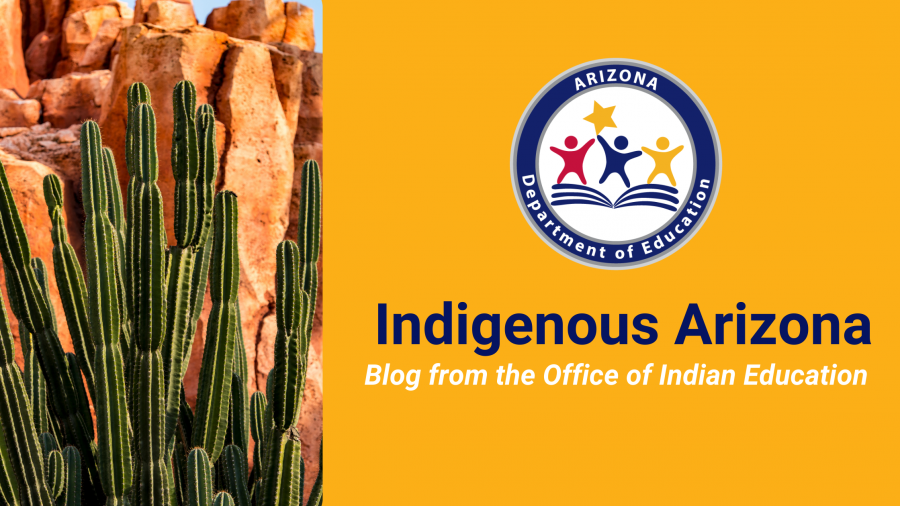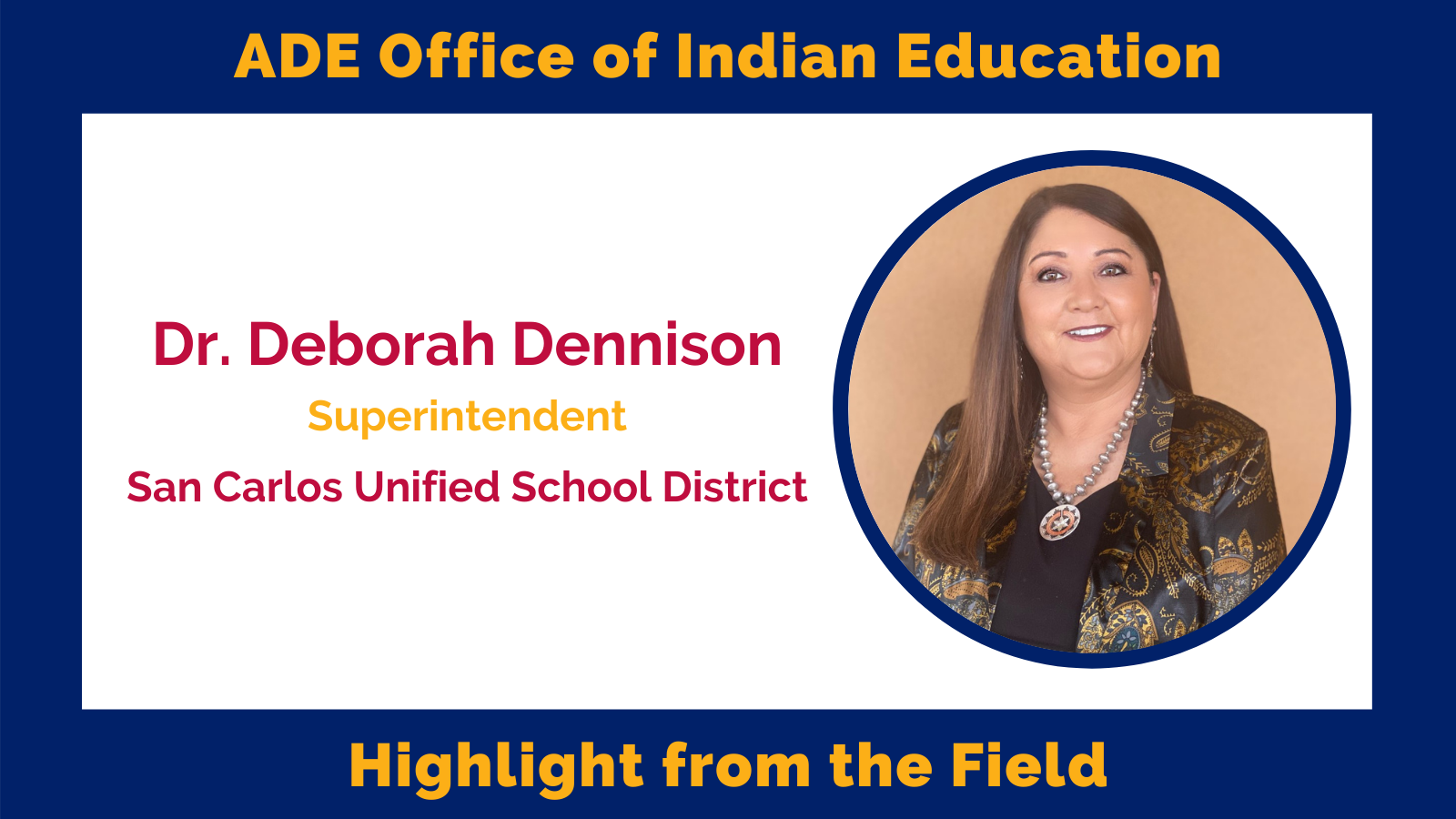Indigenous Arizona #1
- Wed, May 5 2021
-
As part of the new twice-monthly blog, the Office of Indian Education will highlight leaders and programs in Arizona that uplift and serve Indigenous students. For the first feature and in honor of Teacher Appreciation Week, OIE is grateful to spotlight Dr. Deborah Dennison, Superintendent of San Carlos Unified School District on the San Carlos Apache Nation and a member of ADE’s Indian Education Advisory Council.
Dr. Deborah Dennison is of Scottish descent of the McPherson Clan on her maternal side while her paternal heritage is of the Kinyaa'aani (Towering House) Clan of the Diné, (Navajo) people. Her paternal grandfather is of the 'Ashįįhi (Salt People) Clan. Born in Fort Defiance, Arizona, and raised in the community of Window Rock, Deborah is the middle child of 5 siblings of the late Dr. Dean Chee Jackson, a prominent Diné educational leader, and Stephanie McPherson-Jackson. Deborah graduated from Window Rock High School and Diné College before marrying her best friend Karlets Dennison. Together with her late husband, they raised 3 children, Kyle, Devyn, and Kassidy, and are proud grandparents of Kennedy. The Dennison’s as a family, have ranched livestock on their homestead in Tohatchi, New Mexico, and are greatly vested in the sport of Indian and Professional rodeo.
Dr. Dennison obtained her Bachelor of Arts Degree in Education from the University of New Mexico in 1986, and her Masters and Doctoral graduate degrees in Educational Leadership and Policy Studies from Arizona State University in 1997 and 2001 respectively. Known professionally as a life-long educator, Dr. Dennison has always believed passionately in the ideology of continuous school improvement for quality and excellence in education for the Indigenous students she serves using systemic reforms that correlate and integrate with community responsiveness and cultural relevancy throughout all areas that impact learning. In fact, Dr. Dennison’s dissertation titled “Perceptions of Effectiveness in Navajo Nation Public High Schools and Student Achievement, (2001)” continues to guide the research-based reforms in the leadership roles she successfully serves. After teaching at the high school and community college levels, in 2002, Dr. Dennison became the first Navajo woman to serve as an Arizona public school superintendent when she was selected as superintendent of Window Rock Unified School District, also her alma mater. She also successfully served as superintendent of Ganado schools from 2005-2009. In the fall of 2009, Dr. Dennison returned to her former post as Superintendent of Schools for Window Rock Unified School District where once again she and her team worked to revitalize the “Embracing Change for Student Learning” systemic reform model to better correlate with the Navajo philosophy of lifelong-learning while encompassing the components of the Elementary and Secondary Education Act still under reauthorization for her Navajo students to have the quality education system they wholeheartedly deserve.
In May 2010, Dr. Dennison was appointed by President Barack Obama to the National Advisory Council on Indian Education (NACIE) and continues to serve as Chair of NACIE. Dr. Dennison has also served 9 years on the National Association of Federally Impacted Schools (NAFIS) board, as well as 13 years on the National Indian Impacted School Association (NIISA) board. She is also currently serving for a second time as Chair of the Arizona State Impact Aid Association (ASIAA), and currently serves on the Arizona State Superintendent’s Indian Education Advisory Council (IEAC).
Dr. Dennison has served as an Arizona educator for nearly 35 years. A few highlights of her now 18-year career as an Arizona school superintendent include as Chair of ASIAA in 2010, leading the passage of AZ Education HB 2725 that continues to protect federal Impact Aid from state funding sweeps and with less restrictions. Through Dr. Dennison’s research and leadership, Window Rock Unified School District’s “Embracing Change for Student Learning,” Education Reform Model was selected for national recognition and profiled on The Discovery Channel by The Pat Summerall Education Station, highlighting the first public school to implement a K-6 Navajo Immersion School that was also selected for National Testing Services (NTS) research under NCLB “What Works” in Indian Education. Dr. Dennison also led both Window Rock and Ganado schools to increases in student achievement yearly. In 2005 Window Rock Unified School District was the first and only Indian lands public school district in Arizona to have all 7 schools labeled Performing or Performing Plus while also making Adequate Yearly Progress (AYP) by the Arizona Department of Education. From 2009 to 2014, Dr. Dennison led the culturally responsive design, development, finance bonding, and construction to completion of the state of the art, $37- million-dollar, 6,500 seating capacity, Bee Hołdzil (Stronghold) Fighting Scouts Event Center. Dr. Dennison also led Window Rock schools to earn their first-ever Certificate of Achievement for Excellence in Financial Reporting in 2014.
Since July 2016 Dr. Dennison has served as Superintendent of the San Carlos Unified School District, located on the San Carlos Apache Nation in southern Arizona, where once again the Apache students, parents, and community are experiencing positive growth with student achievement district-wide by designing and implementing the necessary systemic reforms named the “Shił Gozhoo” (I am Happy) model to better meet the identified needs and desires within the school and communities of the San Carlos Apache people. Although this work can be very difficult mostly due to some beliefs and misconceptions that have derived from the historical trauma and the failures the formal education systems have had on American Indian people, Dr. Dennison knows the importance of this work for Indian Country and is deeply inspired to continue the lifework and legacy of her late father, Dr. Dean C. Jackson. In recent years Dr. Dennison also founded her business, Indigenous Ingenuity, LLC as a means to expand services and expertise with school reform across Indian country in both the United States and Canada.
From the Arizona Department of Education
In 2020 and 2021, Congress passed three separate COVID-19 federal relief packages. These packages delivered millions of dollars directly to schools and districts and, separately, provided the Arizona Department of Education with discretionary and required set aside ESSER funds to dedicate toward statewide strategic projects and investments. These investments are made to support schools' recovery needs and increase learning opportunities for students through 2024.
ADE is using these dollars to fund critical projects that fulfill our vision statement, “Equity for all students to fulfill their full potential,” and to align with the core principles of our strategic plan. Learn more on our Federal Recovery Funds page!
Federal Recovery Funds: ADE Projects
From External Partners and Stakeholders
Native, Indigenous and American Indian School/Mental Health Leaders Talking Circle
June 24, 2021, 11:00 am (PT) – Register by May 24th: https://zoom.us/meeting/register/tJ0of-GgqjMjHNM9a5a4vFEnfhLKi4TdCH4q
Who: Indigenous, Native/American Indian state, district, county, and tribal leaders of education and school mental health systems in CA, NV, and AZ are welcome. This includes leaders of education and school mental health administrative agencies and systems (e.g., Nevada Department of Education, AZ Behavioral Health).
What: A virtual Talking Circle creates a space for leaders across lands, systems, and roles to come together, learn, and hold space for one another, an opportunity to hear from each other and share.
Why: This experience of COVID during this past year has been deeply painful and grief-ful for so many in the community, on top of so much. School and education system leaders support others always; we want to create a space for the supporters. From the Talking Circle, the needs surfaced with inform future Talking Circles and ways to support one another.
How: Facilitated by Teresa Brewington (see bio below), we gather by Zoom in a circle to dialogue, connect, and hear the joys and needs of being Indigenous, Native, and American Indian while leading education and school mental health initiatives, organizations, departments, or agencies.
Meet your talking circle facilitator: Teresa Brewington, MBA, M.Ed, is an enrolled member of the Coharie Tribe and a descendent of the Lumbee Tribe. She has a Master’s in Educational Leadership, a Master’s in Business Administration, 36 credit hours towards a Master’s in Counseling, and one year towards a Ph.D. in Education. Teresa is the MHTTC K-12 School Supplement Program Manager for the American Indian and Alaska Native MHTTC.
Sponsored by the Pacific Southwest Mental Health Technology Transfer Center Network and the American Indian/ Alaska Native MHTTC
Leading and Learning Together
Earlier this month in Phoenix, a group of Native Women kicked off a motorcycle tour carrying four ribbon skirts representing missing and murdered Indigenous women. Their tour returns to Phoenix today, May 5th in recognition of the National Day of Awareness for Missing and Murdered Native Women and Girls. Read more about their story in the Arizona Republic’s article, 'It's everyone's problem': Women's motorcycle tour group spotlights issue of missing, murdered Indigenous women.









